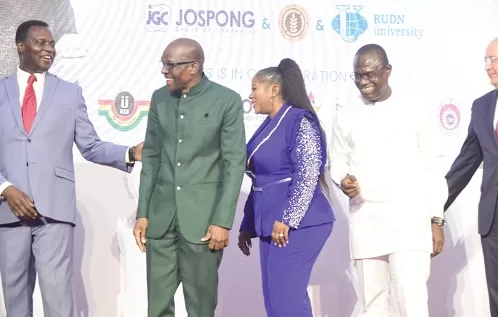The Speaker of Parliament, Alban Bagbin, assured the Jospong Group of Companies (JGC) that the House fully supports the effort when the JGC and the RUDN University of Russia inked a strategic educational collaboration.
As part of the collaboration, at least 600 Ghanaian students will be given scholarships by the Asian, African Consortium (AAC), a JGC affiliate, to study for Master’s and Doctor of Philosophy (PhD) degrees in agriculture-related fields in Russia during the course of the following five years.
The Ministry of Education and the Scholarship Secretariat would work together to facilitate the fully financed competitive scholarships.
The two groups signed the Memorandum of Understanding (MoU), which officially launched their relationship, during a ceremony last Friday in Accra.
The National Service Secretariat, the University of Ghana, the University of Cape Coast (UCC), the University for Development Studies (UDS), the Pentecost University, and the Kwame Nkrumah University of Science and Technology (KNUST) have all been enlisted to help with the initiative’s implementation.
Important figures including the Speaker of Parliament, Dr. Yaw Osei Adutwum, the Minister of Education, Prof. Johnson Nyarko Boampong, the Vice-Chancellor of the University of UCC, Prof. Rita Akosua Dickson of KNUST, and a delegation of seven representatives from RUDN University, led by Prof. Sergey Elansky, were present at the signing ceremony.
Dr. Joseph Siaw Agyepong, the executive chairman of the Jospong Group, stated that the collaboration was a component of the long-term goal to develop human resources with the necessary abilities to advance the nation’s agricultural sector.
He claimed that a portion of the scholarship recipients will find jobs in the diversified agriculture value chain that the firm had entered.
According to Mr. Agyepong, the Jospong Group will keep using strategic investments and the development of human capital to fulfill its share of the nation’s development.
Prof. Masamba Kakh, a lecturer at the RUDN University’s Department of Russian and Foreign Languages and Literature, stated that the collaboration was essential since it would generate the human capital with the vital abilities required for growth.

